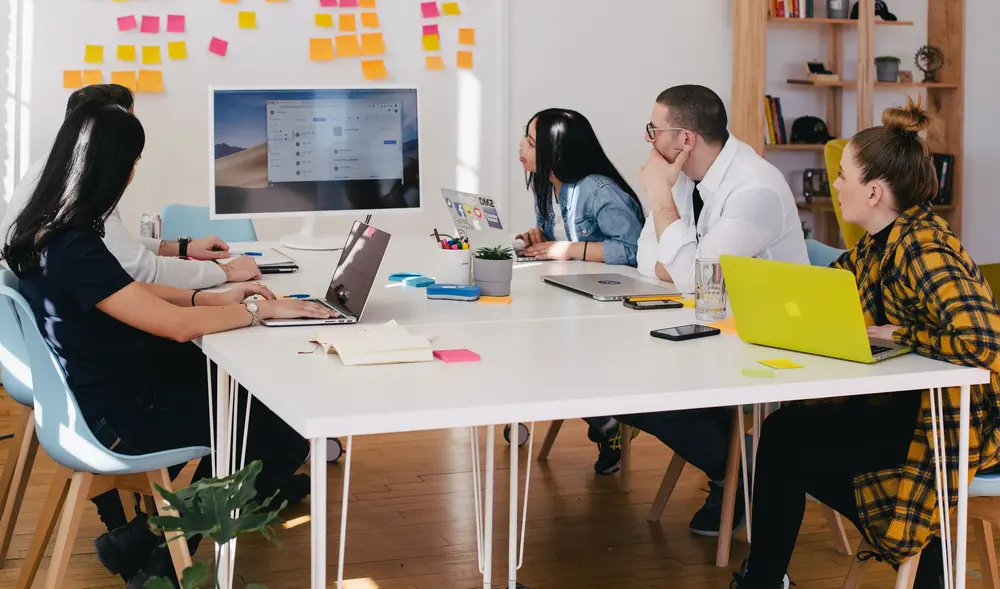Fostering Learning through Collaboration: A Journey through the Digital Learning Lab

In the Summer Semester of 2023, an exciting digital learning initiative took root at the Willy Brandt School of Public Policy. Under the umbrella of the "Digitalization and Internationalization of Education" project at the Brandt School, the Digital Learning Lab was conceived to provide students with a dedicated space for exploring and experimenting with various digital tools. The Digital Learning Lab aims at fostering students’ skills and confidence in the ever-evolving digital landscape.
Empowering Digital Literacy: Introducing the Digital Learning Lab
The ongoing digital transformation is reshaping how students engage with learning, enabling them to harness digital innovation for a more immersive educational experience. This era ushers in a range of cutting-edge technologies driven by machine learning and artificial intelligence, catering to both students and the broader academic community. These digital learning tools have the potential to trigger a paradigm shift in how we access, share, and apply knowledge.
However, technological progress does not guarantee universal adoption. Particularly within social and political science, digital competency varies widely among students. This skill divergence becomes crucial when students collaborate on academic projects, potentially leading to organizational challenges and, at times, disparate outcomes.
Within the context of the Brandt School's "Digitalization and Internationalization of Education" project lies a shared objective: enhancing the digital learning experience for students. The Digital Learning Lab strives to bridge this gap by providing a dedicated space for students to explore and experiment with diverse digital tools, software, and techniques. The lab's primary goal is to empower students with the skills needed to navigate the digital space effectively while optimizing their academic potential. This venture started on a unique principle: "For the Students, By the Students."
Cultivating Digital Learning Culture on Erfurt University Campus
The Digital Learning Lab (DLL) ran throughout the Summer Semester of 2023, from April through July, with monthly sessions. A notable feature of the lab was its hybrid format, accommodating both on-campus attendees and virtual participants via WebEx. Each session featured a fellow Brandt School student sharing expertise on a software tool that could enhance the academic experience. Tools ranged from creating pitch decks and concise videos to refining the educational journey and conducting robust literature searches. Exploring AI features to elevate the quality of academic writing was also integrated into the learning experience.
Initial student reactions were overwhelmingly positive. Students acknowledged the array of state-of-the-art services offered by Erfurt University's IT Department, including licenses for word processing and qualitative research software, GDPR-compliant DFN cloud platforms, and more. The lab fostered a space where students supported each other, sharing ideas, digital platforms, websites, and tips to strengthen their skills, amplify research efforts, and boost productivity.
During the DLL sessions, students not only shared knowledge but also honed their ethical and responsible utilization of these tools, upholding academic standards and integrity. Students agreed that the most challenging aspect of the research and writing process was initiating the literature review, relying on credible sources and scholarly papers instead of navigating random websites. These sessions also delved into AI-based tools for literature searches, drawing lessons from the practices endorsed by the broader scientific community.
Navigating the Digital Space: Widening Impact of the Lab
According to students, the lab facilitated a deeper understanding of the benefits of immersing themselves in the digital world. It was perceived as more than a recreational space—it provided a platform to leverage artificial intelligence to simplify their academic pursuits. Initially planned for only Brandt School's Master's students, the DLL initiative swiftly gained traction among other international students interested in digital topics at the Erfurt University campus. Its significance extended across the international student community at the University of Erfurt, thanks in part to the University's International Office and the instrumental efforts of the internationalisation@home unit, which played a pivotal role in the lab's growth.
Digital Learning and Beyond
Higher education is undergoing a transformative phase driven by rapid technological advancements and the AI sector. The Digital Learning Lab not only fosters digital competency but also encourages meaningful experimentation in the realm of digital learning. Students feel inspired to undertake new initiatives that strengthen their skills for the future. In the foreseeable future, such digital learning spaces will prove more indispensable than ever, nurturing students' growth in an increasingly competitive landscape.
The insights derived from the Digital Learning Lab hold paramount importance, potentially serving as a precursor to several new initiatives, moving from digital competence to data competence. Such an endeavor could equip future policymakers with digital literacy and proficiency to effectively leverage open data using tools like Python or R Programming.
I extend heartfelt gratitude to all the lab moderators, with special recognition for co-organizers and research assistants, Ms. Paulina Gomez and Mr. Shreesh Karmarkar, who breathed life into this transformative initiative.
About the Author

Dr. Hasnain Bokhari is a postdoctoral fellow at the Willy Brandt School of Public Policy, University of Erfurt in Germany. He currently leads a project on the Internationalisation and Digitalisation of Education at the Brandt School and his research focuses on eGovernment, digital inclusion, the digital divide, and social media analytics. He is also an Associate Editor of the Journal of Entrepreneurship and Public Policy and holds a Ph.D. and MA in Public Policy from the University of Erfurt.
~ The views represented in this blog post do not necessarily represent those of the Brandt School. ~